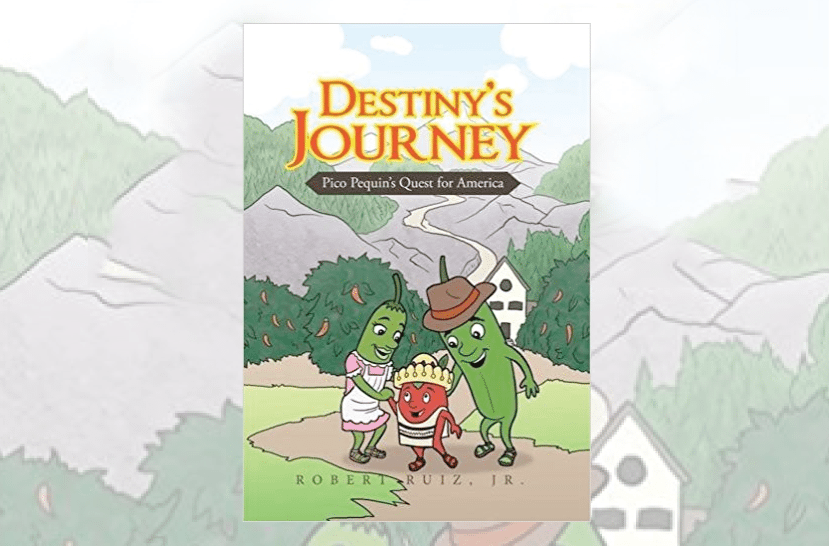Tell us a bit about yourself and your background.
I was born December 31, 1949 and am 67 years old. I was raised in the produce fields of the Rio Grande Valley of South Texas and in the chile pepper, cucumber and cabbage fields in Muleshoe, Texas. At an early age, I traveled with my Father, Robert Ruiz, Sr. to Mexico to buy fields of produce for harvesting and sale in the United States. As I grew-up in the produce industry, I assisted my Father in managing his produce business including sheds in both Edinburg and Muleshoe Texas.
After many years, I left my Father’s business and built and managed my own produce shed and business called Shippers Service, Inc.. At that time, I specialized in the growing, purchase and sale of chile peppers.
What lead you to write a book?
My love for children and my belief that much of what they experience through computerized games and on-line games involves violence as a means of problem solving. Children today are prone to spend their time on the computer with games rather than reading material with pro-social values and positive messages leading to healthy and productive lives as adults and citizens of the Unites States. I wanted to write a book that emphasized moral character and family values and hope.
Why did you choose a family of chile peppers to drive the story?
Many young Mexican and Hispanic people, including children, are involved in the produce business as growers, harvesters and migrant field hands, shippers, produce shed workers, etc.. Many of these individuals are involved with chiles of all kinds from fields of chile peppers spread out across America from California to Florida, Texas to Canada and throughout many Latin American countries with Mexico being a huge supplier.
With this backdrop in mind, I wanted a vehicle for delivering an exciting adventure story and its underlying messages that all ethnic groups in addition to Latin American and Hispanic young people could relate too.
Why was Pico the hottest chile of the family?
Pico was the hottest chile in his particular family but not in the larger chile population. All families have children that vary in their individual characteristics. In this case, Pico was small and hot.
Why did you mean to have the family Immigrate to America?
Many people in Mexico work for a minimum wage of $3.00 to $6.00 a day. Many small farmers in Mexico have a harsh way of life with few options to better the lives of themselves and their families. Some opt to serve cartels and drug lords by planting marijuana or poppys for larger sums of money. Others seek ways to immigrate to the United States because they see this as a way to improve their family’s quality of life. Papa Jalapeno, Mama Serrano and Pico Pequin are symbolic representations of many Latin American families.
How do you justify the family hardships on the trip?
These hardships are intended to provide character building trials, story excitement, and are, to varying extents, reflective of the hardships many Latin American families face when attempting to immigrate to the United States.
Do you plan other types of fantasy stories?
I have a “follow-up” to this story in mind but do not know when I will start the writing.
Was there someone in your real family that allowed you to connect Pico to?
Both of my parents were born in Mexico and immigrated to the United States. Though they faced many immigration hardships, they achieved it legally. My Father, Robert Ruiz, Sr., became a member of the Produce Hall of Fame as one of the top one hundred shippers in the United States.
To whom did the story make you feel close to as you wrote it?
The story made me feel closer to my parents and to the Latin American people seeking a better life.
How can you continue your message to your readers?
Living and working in the Hispanic and Mexican communities and my involvement in the produce business hopefully carries a positive and powerful message to both children and adults. I have, over time, met with school children and school authorities to share my life story with them as someone coming from very little to owning my own corporation. My message includes encouragement to maintain unwavering faith and trust in a Higher Power that helps us all.
What is most important in Destiny’s Journey?
The recognition and sharing of the universal values of life including love, joy, peace, kindness, patience, faithfulness, gentleness and self-control. These values, exercised through determination and perseverance, will lead to a fulfilling and successful life.
Why Destiny’s Journey?
“Destiny’s Journey” provided a way to lift-up and encourage young people to invest themselves in pursuing their dreams morally, ethically and with unwavering perseverance and determination regardless of the obstacles.

